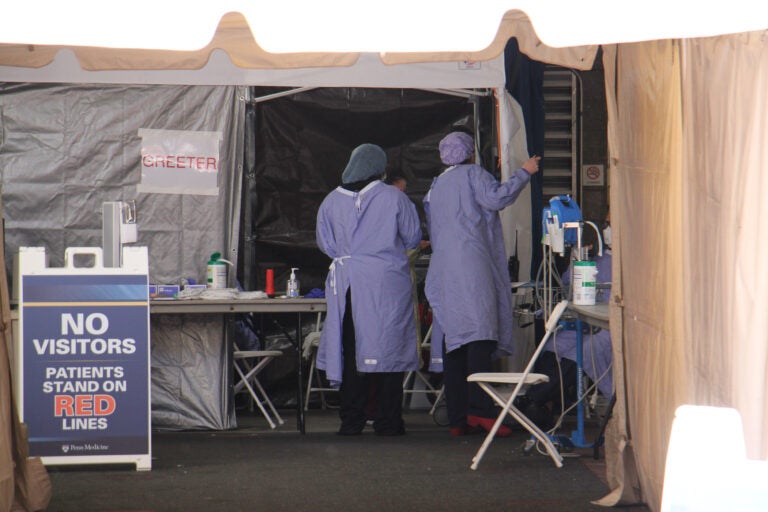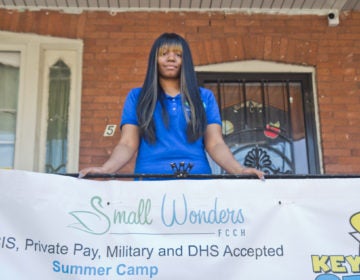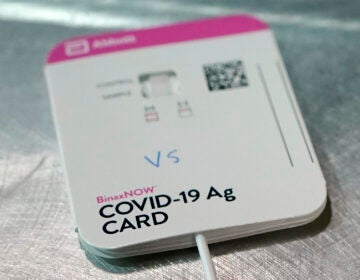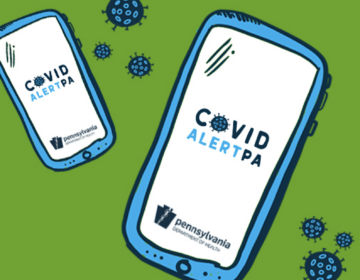Coronavirus update: Philly pleads for federal government support
For the last week, the number of new cases in Pa. each day averaged around 9%, the first time the growth rate has been in the single digits.

A tent outside the the emergency room at the University of Pennsylvania allows patients to be screened for COVID-19 before they enter the building. (Emma Lee/WHYY)
Updated at 6:42 p.m.
–
Are you on the front lines of the coronavirus? Help us report on the pandemic.
As of Monday, there are 24,202 confirmed COVID-19 cases in Pennsylvania, 64,584 in New Jersey, and 1,625 cases in Delaware. Philadelphia has 6,810 cases.
Pennsylvania’s death toll stands at 587, New Jersey’s at 2,443, and Delaware’s at 35. Philadelphia’s death toll is 176.
ICE wants detainees it released due to COVID-19 to turn themselves back in
The latest twist in an ongoing court battle around ICE detention during the coronavirus pandemic, U.S. Immigration and Customs Enforcement has requested that 18 men it had previously released on a judge’s orders to return to custody.
All of the men suffer from conditions that put them at higher risk of fatality if they contract COVID-19, such as diabetes.
On Friday, a federal judge in Harrisburg ordered ICE to release the 20 remaining plaintiffs in an ongoing lawsuit from custody, because all had underlying medical conditions that would put them at extra risk if they contracted coronavirus. ICE complied and released 18 of them from jails in Clinton, York and Pike County where the federal government pays local corrections facilities for bed space. That same day, the federal government also applied for a stay of their release in the federal Third Circuit Court of Appeals.
Late Friday, that court granted the stay.
“Because Chief Judge Smith has since stayed the TRO [temporary removal order], it is critical that all parties work to restore the status quo,” wrote U.S. attorney David J. Freed, in an email to opposing counsel on Monday. He asked whether clients would “voluntarily self-report” to ICE’s office in charge of deportations by 4 p.m.
Attorneys for the formerly detained immigrants indicate that they won’t comply.
“Your request that the eighteen medically vulnerable Petitioners return to detention facilities with documented COVID-19 contagion is cruel and irresponsible,” responded Witold Walczak with the ACLU of Pennsylvania. He noted some of the men are already outfitted with ankle monitors or are required to check in with ICE officials.
The case remains on appeal.
Philadelphia sounds the alarm about financial situation as coronavirus cases level off
Philadelphia officials cheered the slowing spread of coronavirus, which they say “solid evidence” links to social distancing, during a press briefing Monday.
“The numbers are looking like we may be near or at the peak,” said Philadelphia Department of Health Commissioner Dr. Thomas Farley.
The city announced 14 more deaths and 250 new cases. While the number of new coronavirus cases is still higher than some past weeks, Monday marked the smallest increase in two weeks. This is “reason for hope,” said Farley.
There are currently 711 COVID-19 patients being treated in the city’s hospitals and 1,289 across the Philadelphia region. Sixty-six people have tested positive for coronavirus in Philadelphia’s jails. Those cases have not filled the available beds in the City and the supply of ventilators and emergency rooms have not been overwhelmed, said Farley.
Even as the surge appeared to be cresting, Mayor Jim Kenney said he’s pleading for support from the federal government for more rapid testing capacity and protective equipment.
In the future, “the Philadelphia region is at risk of a surge,” he said. While there is pressure to reopen the national economy, “What I worry about is when the numbers are starting to look better and we’re getting signals from the national government that they want to move quickly, people start believing that they can stop the social distancing, go out and do what they used to, and if they do that we’re going to be back in the same situation … that we’re in today.”
In a letter to Congress and House Speaker Nancy Pelosi, Kenney pleaded for infusions of cash so the city can replace lost revenues. Without this support, the city may be forced to cut existing programs and see an increase in the number of residents facing homelessness and hunger.
“The COVID-19 health crisis has magnified the housing need, with low-income renters facing eviction, and homeowners facing mortgage payment crises,” said the mayor, who asked for mortgage and rental assistance for 300,000 housing-insecure Philadelphians. The legislature is considering another relief bill — on top of those already passed — aimed at stabilizing the economy, which the mayor said he hoped would include support for public pensions and more small business loans.
More than 6,000 people have applied for the Philadelphia COVID-19 Relief Fund. The deadline to apply is midnight on April 15, and the city plans to issue funding to at least 1,000 micro-businesses, those that bring in less than $500,000 in revenue a year.
“The road to recovery will not be easy, but we’re committed to doing all we can to support Philadelphia business and its workers,” said Kenney.
Governors launch working group on reopening the economy
The governors of New Jersey, Pennsylvania, Delaware, New York, Connecticut and Rhode Island announced Monday they were creating a joint working group to study how to reopen the regional economy once the coronavirus pandemic is under control.
The six Democrats made the announcement on a conference call with reporters just a few hours after President Trump, a Republican, said on Twitter “it is the decision of the president” when to send Americans back to work and reopen businesses.
….It is the decision of the President, and for many good reasons. With that being said, the Administration and I are working closely with the Governors, and this will continue. A decision by me, in conjunction with the Governors and input from others, will be made shortly!
— Donald J. Trump (@realDonaldTrump) April 13, 2020
“Seeing as we had the responsibility for closing the state down,” said Pennsylvania Gov. Tom Wolf, “I think we probably have the primary responsibility for opening it back up.”
New York Gov. Andrew Cuomo said the working group will consist of a public health official and an economic development official from each state, as well as each governor’s chief of staff.
The governors stressed that they would proceed cautiously with any loosening of social distancing mandates and did not provide a timeline for when that would begin.
“An economic recovery only occurs on the back of a complete health care recovery, and that order is essential,” New Jersey Gov. Phil Murphy said. “Getting that wrong, transposing those steps or jumping in too early, or maybe jumping in by ourselves … you could have inadvertent, unintended consequences, which could be grave.”
Cuomo also said that approaches may vary state-by-state but that regional coordination is still merited given how people and goods — and therefore the virus — move between the states.
New growth in Pa. cases now in single digits
Pennsylvania confirmed an additional 1,366 positive cases of COVID-19 Monday, bringing the statewide total to 24,199.
As cases continue to mount, health officials stress that the virus is slowing down, likely due to social distancing measures. For the last week, the number of new cases in Pennsylvania each day averaged around 9%, the first time the growth rate has been in the single digits since the start of the crisis.
“COVID-19 cases and deaths continue to rise in Pennsylvania, and even though the daily increases are not exponential, now is not the time to become complacent,” said Secretary of Health Dr. Rachel Levine on Monday. Across the state, 105,593 people have tested negative for coronavirus.
About 40% of Pennsylvania’s ICU beds and 70% of ventilators remain available, according to state officials. Those officials don’t believe Pennsylvania has hit its peak yet, but they say the state, so far, seems to have avoided the exponential surge seen in other parts of the country and world.
“It really could be much, much worse,” said Secretary of Health Dr. Rachel Levine. “Social distancing works. And the closures are saving lives in Pennsylvania.”
In the same breath, Levine warned against quickly lifting the mass business closures ordered by Gov. Tom Wolf.
“Opening now would be a very big mistake,” Levine said.
“That would cost lives and lead to the potential overwhelming of our health care system,” she added. “I have actually been arguing for more strict closure orders. And the governor is taking a very moderate approach — balancing, of course, the public health needs with the economic needs and the social needs of everyone in Pennsylvania.”
Levine later declined to say where she and the governor disagreed, only offering that it had to do with which businesses should be allowed to remain open.
Pa. receives masks, gloves, gowns from national stockpile
After staring down shortages of crucial protective equipment, Pennsylvania health officials said they have received all of the masks, gloves and gowns they requested from the federal emergency stockpile.
The commonwealth has still not received any of the 1,000 ventilators it asked for, and most but not all of the N95 masks, which filter the air a wearer breathes in and are crucial for keeping health care workers treating COVID-19 patients safe.
Secretary of Health Dr. Rachel Levine said the state is expecting another shipment of N95 masks “hopefully later this later week.” She said Gov. Tom Wolf and U.S. Vice President Mike Pence discussed the details of that shipment during a phone call Monday morning.
Also still in short supply are nasal swabs and other equipment related to testing for the virus.
There has been a crunch for protective equipment felt across all industries deemed “essential” during the pandemic lockdown. From doctors to grocery store workers to home health aides, demand for protective gear has far outstripped the supply.
The state said it has been working to buy, procure and distribute supplies as they arrive.
“We have pushed PPE out to all long-term care facilities in the state, which is approximately 700 nursing homes and approximately 1,200 personal care homes,” said Department of Health spokesman Nate Wardle. “We are also pushing data to hospitals on a regular basis and also to counties to distribute to first responders, coroners and others who might request PPE.”
As of last week, the Hospital Association of Pennsylvania predicted that 85% of hospitals would run out of N95 masks within seven days. In many cases, health care workers are reusing supplies intended to be single-use, and using unproven techniques to try to extend the life of protective equipment. It’s not clear how the latest infusion of supplies from the federal government could defray this need.
Violent crime remains down in Philadelphia
Violent crime in Philadelphia is now down nearly 30% since March 9, the day before the city reported its first positive case of COVID-19.
Notably, the Philadelphia Police Department recorded zero homicides last week — a first since the pandemic hit the city.
Shootings dropped more than 30% last week, though there have been an average of 50 shootings a week since March 9. The city averaged 44 shootings each week during the five weeks prior to the pandemic reaching Philadelphia.
Property crime, which includes burglaries and car thefts, has decreased roughly 11% since March 9. It increased 2% last week.
Montco officials: “peak” likely was last week, but coronavirus still a problem in nursing homes
As test results roll in, Montgomery County officials believe that the area may have experienced a peak in coronavirus cases early in the week of April 6.
“One day last week, we hit a high of about 24% of people who tested that day came back positive,” said Montgomery County commission chair Val Arkoosh. In the days before, that rate rose and in the days after, it fell. Based on that trend, officials believe that spread of the virus may be on the decline.
“It means we’re doing everything right,” said Arkoosh, who cautioned that the county would not encourage people to move about freely again without more testing.
This estimate only applies to people who visited the county’s public testing sites.
By contrast, nursing homes and assisted living centers in Montgomery County continue to experience a high number of cases. Some facilities continue to have cases, and some are just starting to have their first confirmed coronavirus breakouts, according to Arkoosh. A total of 306 residents and 166 staffers at group care facilities have coronavirus.
To attempt to track the spread in these communities, county officials have teamed up with Real Time Medical to compile anonymized case information about COVID-19 patients inside group facilities.
The county also recently opened a medical surge facility, with beds to treat 35 COVID-19 and non-COVID-19 patients. A federally-supported testing site which closed down last week will be reopening on the campus of Montgomery County Community College, but will likely not meet its open date of Wednesday, April 15th, due to today’s extreme weather.
Pa. confirms first COVID-19 death in a prison
An incarcerated person held at the State Correctional Institute – Phoenix died of COVID-19 on April 8, the Pennsylvania Department of Corrections has shared.
It took several days for the coroner to rule that the cause of death, acute respiratory distress stemming from pneumonia, was related to coronavirus. The state did not release the name of the 67-year-old, who passed away while receiving treatment at Einstein Medical Center.
This marks the first death from COVID-19 in Pennsylvania’s prisons. Elsewhere around the country, prisons and detention centers have become hotspots for transmission.
On March 29th, the DOC instituted a system-wide lockdown to try to prevent the spread. As of last week, 11 inmates and 19 employees had tested positive for coronavirus across all state correctional facilities. All of the cases among prisoners are at SCI-Phoenix, in Montgomery County.
Some Pa. counties call for all-mail election
The top official in Pennsylvania’s second-most populous county is pushing for the authority to send a mail-in ballot to every registered voter there so that the June 2 primary election can be conducted entirely by mail.
Allegheny County Executive Rich Fitzgerald on Friday said holding an in-person election in the midst of the coronavirus crisis would be a “disaster.” He wants an expansion of the state’s emergency declaration to allow the move.
Officials in a pair of suburban Philadelphia counties, Montgomery and Chester, are also backing the idea of an all-mail election.
WHYY’s Nick Pugliese, Aaron Moselle and Avi Wolfman-Arent and the Associated Press contributed to this report.
WHYY is your source for fact-based, in-depth journalism and information. As a nonprofit organization, we rely on financial support from readers like you. Please give today.



![CoronavirusPandemic_1024x512[1]](https://whyy.org/wp-content/uploads/2020/03/CoronavirusPandemic_1024x5121-300x150.jpg)


